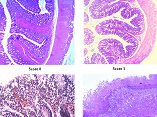Evaluation of the Anti-Oxidative Effects of Monocyte Cells Treated with Bone Marrow Mesenchymal Stem Cells Supernatant on Experimental Colitis in BALB/c Mice
DOI:
https://doi.org/10.31661/gmj.v10i.2131Keywords:
Monocyte, Mesenchymal Stem Supernatant, Colitis, BALB/c MiceAbstract
Background: Alternate activation of monocytes could induce anti-inflammatory impacts. This study aimed to investigate whether monocyte cells treated with bone marrow mesenchymal stem cells supernatant (MSC-Sp) could improve anti-inflammatory responses as a cell transfer therapy for colitis. Materials and Methods: The induction of experimental colitis was done by acetic acid in four groups of male BALB/c mice, including the control colitis, treated-monocytes, non-treated-monocytes, and mesalazine groups. Following MSCs culture, the supernatant was harvested, and then 50% conditioned media, or negative control media was added to the monocytes for 24 h. After ten days, peritoneal injection of treated or non-treated-monocytes (105 cells/100µL) was performed in animals' relevant groups of colitis. Ten days later, the oxidative stress profile and histopathological evaluation of colon tissue were assessed. Results: Treated monocytes showed a significant improvement in the oxidative stress profile, namely myeloperoxidase (0.126±0.008), nitric oxide (0.153±0.01), and malondialdehyde (0.148±0.014) compared to the control colitis group (P<0.05). Also, histopathological results revealed that the rate of damage in the treated-monocytes group was less than in normal mice. Conclusion: Our study indicated that the treated monocytes had anti-oxidative potential in colitis mice and were usable as a complementary therapy. [GMJ.2021;10:e2131]
References
Danese S, Fiorino G, Peyrin-Biroulet L. Positioning therapies in ulcerative colitis. Clin Gastroenterol Hepatol. 2020;18(6):1280-90.
https://doi.org/10.1016/j.cgh.2020.01.017
PMid:31982609
Corridoni D, Antanaviciute A, Gupta T, Fawkner-Corbett D, Aulicino A, Jagielowicz M, et al. Single-cell atlas of colonic CD8+ T cells in ulcerative colitis. Nat Med. 2020;26(9):1480-90.
https://doi.org/10.1038/s41591-020-1003-4
PMid:32747828
Nanki K, Fujii M, Shimokawa M, Matano M, Nishikori S, Date S, et al. Somatic inflammatory gene mutations in human ulcerative colitis epithelium. Nature. 2020;577(7789):254-9.
https://doi.org/10.1038/s41586-019-1844-5
PMid:31853059
Zhou X-L, Yang J, Qu X-J, Meng J, Miao R-R, Cui S-X. M10, a myricetin-3-ObD-Lactose sodium salt, prevents ulcerative colitis through inhibiting necroptosis in mice. Front Pharmacol. 2020;11:557312.
https://doi.org/10.3389/fphar.2020.557312
PMid:33041798 PMCid:PMC7517943
Wan S, Wu Q, Ji Y, Fu X, Wang Y. Promotion of the immunomodulatory properties and osteogenic differentiation of adiposeâ€derived mesenchymal stem cells in vitro by lentivirusâ€mediated mirâ€146a sponge expression. J Tissue Eng Regen Med. 2020;14(11):1581-91.
https://doi.org/10.1002/term.3113
PMid:32761798
Cao C, Tarlé S, Kaigler D. Characterization of the immunomodulatory properties of alveolar bone-derived mesenchymal stem cells. Stem Cell Res Ther. 2020;11(1):1-13.
https://doi.org/10.1186/s13287-020-01605-x
PMid:32138791 PMCid:PMC7059346
Liu H, Li R, Liu T, Yang L, Yin G, Xie Q. Immunomodulatory Effects of Mesenchymal Stem Cells and Mesenchymal Stem Cell-Derived Extracellular Vesicles in Rheumatoid Arthritis. Front Immunol. 2020;11:1912.
https://doi.org/10.3389/fimmu.2020.01912
PMid:32973792 PMCid:PMC7468450
Zhou Y, Fu B, Zheng X, Wang D, Zhao C, Qi Y, et al. Pathogenic T-cells and inflammatory monocytes incite inflammatory storms in severe COVID-19 patients. Natl Sci Rev. 2020;7(6):998-1002.
https://doi.org/10.1093/nsr/nwaa041
PMid:34676125 PMCid:PMC7108005
Esmaili Gourvarchin Galeh H, Meysam Abtahi Froushani S, Afzale Ahangaran N, Hadai SN. Effects of Educated Monocytes with Xenogeneic Mesenchymal Stem Cell-Derived Conditioned Medium in a Mouse Model of Chronic Asthma. Immunol Invest. 2018;47(5):504-20.
https://doi.org/10.1080/08820139.2018.1458108
PMid:29671652
Abtahi Froushani SM, Mashhouri S. The Effect of Mesenchymal Stem Cells Pulsed with 17 Beta-Estradiol in an Ameliorating Rat Model of Ulcerative Colitis. Zahedan Journal of Research in Medical Sciences. 2019.
https://doi.org/10.5812/zjrms.83762
Mashhouri S, Meysam Abtahi Froushani S, Asghar Tehrani A. Non-Adherent Bone Marrow-Derived Mesenchymal Stem Cells Ameliorate Clinical Manifestations and Inflammation in an Experimental Model of Ulcerative Colitis in Rats.IJIMS. 2020;45(5):341-51.
Song N, Scholtemeijer M, Shah K. Mesenchymal Stem Cell Immunomodulation: Mechanisms and Therapeutic Potential. Trends Pharmacol Sci. 2020;41(9):653-64.
https://doi.org/10.1016/j.tips.2020.06.009
PMid:32709406 PMCid:PMC7751844
Harrell CR, Jovicic N, Djonov V, Arsenijevic N, Volarevic V. Mesenchymal Stem Cell-Derived Exosomes and Other Extracellular Vesicles as New Remedies in the Therapy of Inflammatory Diseases. Cells. 2019;8(12):1605.
https://doi.org/10.3390/cells8121605
PMid:31835680 PMCid:PMC6952783
Randhawa PK, Singh K, Singh N, Jaggi AS. A review on chemical-induced inflammatory bowel disease models in rodents. Korean J Physiol Pharmacol. 2014;18(4):279-88.
https://doi.org/10.4196/kjpp.2014.18.4.279
PMid:25177159 PMCid:PMC4146629
Piechota-Polanczyk A, Fichna J. Review article: the role of oxidative stress in pathogenesis and treatment of inflammatory bowel diseases. Naunyn Schmiedebergs Arch Pharmacol. 2014;387(7):605-20.
https://doi.org/10.1007/s00210-014-0985-1
PMid:24798211 PMCid:PMC4065336
Kurutas EB, Cetinkaya A, Bulbuloglu E, Kantarceken B. Effects of antioxidant therapy on leukocyte myeloperoxidase and Cu/Zn-superoxide dismutase and plasma malondialdehyde levels in experimental colitis. Mediators Inflamm. 2005;2005(6):390-4.
https://doi.org/10.1155/MI.2005.390
PMid:16489261 PMCid:PMC1533903
Kyurkchiev D, Bochev I, Ivanova-Todorova E, Mourdjeva M, Oreshkova T, Belemezova K, et al. Secretion of immunoregulatory cytokines by mesenchymal stem cells. World J Stem Cells. 2014;6(5):552-70.
https://doi.org/10.4252/wjsc.v6.i5.552
PMid:25426252 PMCid:PMC4178255
Yi T, Song SU. Immunomodulatory properties of mesenchymal stem cells and their therapeutic applications. Arch Pharm Res. 2012;35(2):213-21.
https://doi.org/10.1007/s12272-012-0202-z
PMid:22370776
Mittal M, Siddiqui MR, Tran K, Reddy SP, Malik AB. Reactive oxygen species in inflammation and tissue injury. Antioxid Redox Signal. 2014;20(7):1126-67.
https://doi.org/10.1089/ars.2012.5149
PMid:23991888 PMCid:PMC3929010
MacDonald ES, Barrett JG. The Potential of Mesenchymal Stem Cells to Treat Systemic Inflammation in Horses. Front Vet Sci. 2019;6:507.
https://doi.org/10.3389/fvets.2019.00507
PMid:32039250 PMCid:PMC6985200
Melief SM, Geutskens SB, Fibbe WE, Roelofs H. Multipotent stromal cells skew monocytes towards an anti-inflammatory interleukin-10-producing phenotype by production of interleukin-6. Haematologica. 2013;98(6):888-95.
https://doi.org/10.3324/haematol.2012.078055
PMid:23349310 PMCid:PMC3669444
Stavely R, Nurgali K. The emerging antioxidant paradigm of mesenchymal stem cell therapy. Stem Cells Transl Med. 2020;9(9):985-1006.
https://doi.org/10.1002/sctm.19-0446
PMid:32497410 PMCid:PMC7445024

Published
How to Cite
Issue
Section
License
Copyright (c) 2021 Galen Medical Journal

This work is licensed under a Creative Commons Attribution 4.0 International License.







